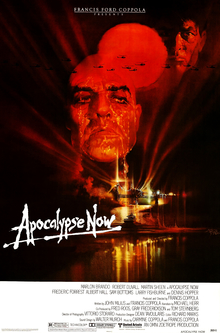| Apocalypse Now | |
|---|---|
 Theatrical release poster by Bob Peak | |
| Directed by | Francis Coppola |
| Written by |
|
| Narration by | Michael Herr |
| Produced by | Francis Coppola |
| Starring | |
| Cinematography | Vittorio Storaro |
| Edited by | |
| Music by |
|
Production company | |
| Distributed by | United Artists |
Release dates | |
Running time |
|
| Country | United States |
| Language | English |
| Budget | $31.5 million[3][4][5] |
| Box office | $104.8–150 million[6][7][8] |
Apocalypse Now is a 1979 American epic war film produced and directed by Francis Ford Coppola. The screenplay, co-written by Coppola, John Milius, and Michael Herr, is loosely inspired by the 1899 novella Heart of Darkness by Joseph Conrad, with the setting changed from late 19th-century Congo to the Vietnam War. The film follows a river journey from South Vietnam into Cambodia undertaken by Captain Willard (Martin Sheen), who is on a secret mission to assassinate Colonel Kurtz (Marlon Brando), a renegade Special Forces officer who is accused of murder and presumed insane. The ensemble cast also features Robert Duvall, Frederic Forrest, Albert Hall, Sam Bottoms, Laurence Fishburne, Dennis Hopper, and Harrison Ford.
Milius became interested in adapting Heart of Darkness for a Vietnam War setting in the late 1960s, and initially began developing the film with Coppola as producer and George Lucas as director. After Lucas became unavailable, Coppola took over directorial control, and was influenced by Werner Herzog's Aguirre, the Wrath of God (1972) in his approach to the material. Initially set to be a five-month shoot in the Philippines starting in March 1976, a series of problems lengthened it to over a year. These problems included expensive sets being destroyed by severe weather, Brando showing up on set overweight and completely unprepared, and Sheen having a breakdown and suffering a near-fatal heart attack on location. After photography was finally finished in May 1977, the release was postponed several times while Coppola edited over a million feet of film. Many of these difficulties are chronicled in the documentary Hearts of Darkness: A Filmmaker's Apocalypse (1991).
Apocalypse Now was honored with the Palme d'Or at the Cannes Film Festival, where it premiered unfinished. When it was finally released on August 15, 1979, by United Artists, it performed well at the box office, grossing over $80 million in the United States and Canada and over $100 million worldwide. Initial reviews were polarized; while Vittorio Storaro's cinematography was widely acclaimed, several critics found Coppola's handling of the story's major themes anticlimactic and intellectually disappointing. The film was nominated for eight Academy Awards, including Best Picture, Best Director (Coppola), and Best Supporting Actor (Duvall); it went on to win Best Cinematography and Best Sound.
Apocalypse Now is retrospectively considered one of the greatest films ever made; it has been assessed as Coppola's masterpiece and appeared on various best-of films in 20th-century and of all time lists. In 2000, the film was selected for preservation in the National Film Registry by the U.S. Library of Congress as "culturally, historically or aesthetically significant."
- ^ Cite error: The named reference
varwas invoked but never defined (see the help page). - ^ "Apocalypse Now". British Board of Film Classification. Archived from the original on April 2, 2015. Retrieved December 20, 2014. Retrieved December 3, 2017
- ^ Harmetz, Aljean (February 2, 1981). "Coppola Risks All On $22 Million Movie". The New York Times.
- ^ Appelo, Tim (August 30, 2014). "Telluride: Francis Ford Coppola Spills 'Apocalypse Now' Secrets on 35th Anniversary". The Hollywood Reporter. Archived from the original on September 2, 2014. Retrieved August 5, 2019.
- ^ "Apocalypse Now (1979)". The Numbers. Retrieved September 27, 2024.
- ^ Cowie 1990, p. 132.
- ^ Hinson, Hal (January 17, 1992). "'Hearts of Darkness: A Filmmaker's Apocalypse'". The Washington Post. Archived from the original on October 4, 2020. Retrieved August 1, 2021.
- ^ Doherty, Thomas (April 22, 2024). "For Francis Ford Coppola's Go-for-Broke Movies, All Roads Lead to Cannes". The Hollywood Reporter.